News

Mon, 04/28/2025
HCDE impact: Leading the nationwide effort to protect US research security
The SECURE Center, led by HCDE Professor Mark Haselkorn and supported by the National Science Foundation, is uniting the US research community to address critical security challenges while preserving the openness that drives scientific progress. By coordinating with regional centers and industry partners, SECURE ensures that US research remains protected, fostering both national security and economic competitiveness.
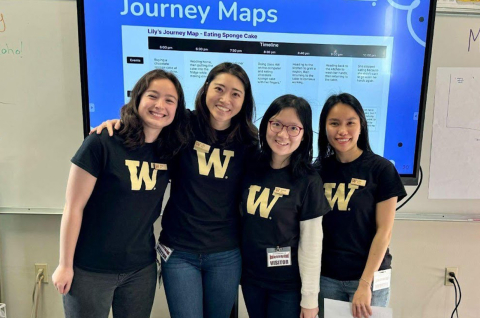
Thu, 04/24/2025
HCDE impact: Inspiring Washington's K-12 students in Engineering
For over a decade, HCDE has brought human-centered design to K–12 classrooms across Washington state through hands-on, community-driven outreach. Led by students and faculty, the program inspires young learners to see themselves as designers and problem-solvers—especially in communities with limited access to STEM. Since relaunching in 2023, the program has reached over 350 students with age-appropriate, culturally responsive workshops.

Wed, 04/23/2025
HCDE at CHI 2025
UW HCDE has strong presence at the 2025 Conference on Human Factors in Computing Systems (CHI), the premier international conference on Human-Computer Interaction. HCDE researchers contributed to 36 papers, including one selected for the Best Paper Award recognition and six selected for Best Paper Honorable Mention recognition.

Mon, 04/21/2025
Four HCDE students named to the 2025 Husky 100
HCDE students Grace Carina Bunarto, Mishti Dhawan, Damini Sheth, and Mina Zavary have been named to the University of Washington’s 2025 Husky 100. This annual recognition honors 100 students across the UW’s three campuses who demonstrate a commitment to leadership, community engagement, and applying their education to make a meaningful impact.

Mon, 04/14/2025
HCDE PhD candidate Sourojit Ghosh receives UW Excellence in Teaching Award
The University of Washington has named HCDE PhD candidate Sourojit "G" Ghosh a recipient of the 2025 Excellence in Teaching Award, one of the University’s highest honors for teaching. The award, presented by UW President Ana Mari Cauce and Provost Tricia Serio, recognizes Ghosh’s extraordinary commitment to teaching and mentorship.

Thu, 04/10/2025
HCDE impact: Advancing renewable marine energy to strengthen coastal communities
Renewable marine energy—power generated from ocean waves and tides—could play a big role in boosting coastal economies and reducing US dependence on fossil fuels. HCDE Assistant Research Professor Shana Lee Hirsch works with the Pacific Marine Energy Center (PMEC) to make sure this clean energy benefits local communities by creating jobs and supporting long-term economic stability. But recent federal funding cuts are putting that progress at risk. To keep the US competitive in the global clean energy race, continued investment in marine energy is essential.
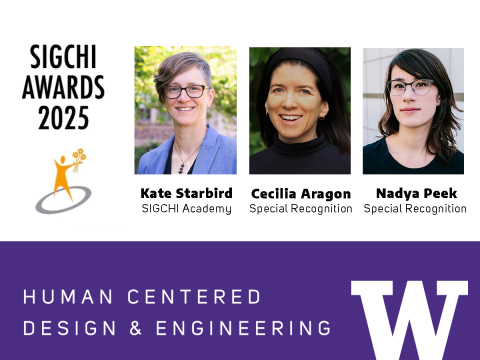
Sat, 03/15/2025
HCDE faculty honored with prestigious ACM SIGCHI Awards
HCDE Professor Kate Starbird is joining the esteemed ranks of the ACM SIGCHI Academy, and Professors Cecilia Aragon and Nadya Peek are honored with ACM SIGCHI Special Recognition. These awards celebrate their remarkable contributions to Human-Computer Interaction, recognizing their excellence in research, teaching, practice, and service.

Sat, 03/01/2025
Kate Starbird presents the UW Faculty Lecture: A Spotlight on Rumors
HCDE Professor Kate Starbird delivered the University Faculty Lecture in February 2025. She presented insights from over a decade of research on how online rumors, misinformation, and disinformation are created and shared during uncertain times.

Tue, 02/25/2025
Q&A with HCDE PhD student Brett Halperin: How AI is changing the film industry
As AI makes its way into filmmaking, industry workers are grappling with its impact. During the 2023 Hollywood strikes, Brett Halperin, a PhD student in HCDE, interviewed picketing film workers about AI’s role in the industry — from job security to artistic authenticity. Halperin's research, now published in ACM Transactions on Computer-Human Interaction, sheds light on these emerging concerns.

Tue, 02/18/2025
Coffee grounds and Reishi mushroom spores can be 3D printed into a compostable alternative to plastics
HCDE PhD student Danli Luo has developed an innovative system to transform used coffee grounds into a 3D-printable paste. By inoculating the paste with Reishi mushroom spores, Luo and her collaborators have created a durable, compostable alternative to plastics, which can be used to print objects like packing materials and vases.
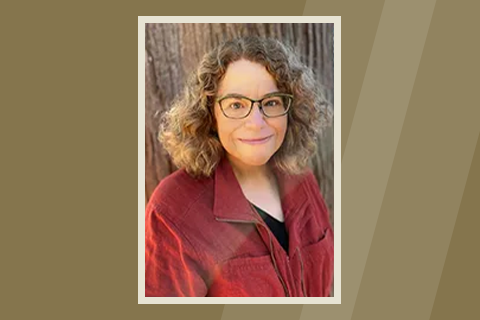
Sat, 02/15/2025
HCDE alumna Donna Sakson receives 2025 Diamond Award
HCDE alumna Donna Sakson (BS '82), was named a 2025 Diamond Award recipient by the UW College of Engineering Dean Nancy Allbritton. The Diamond Awards honor outstanding alumni and friends of the College who have made significant contributions to the field of engineering.
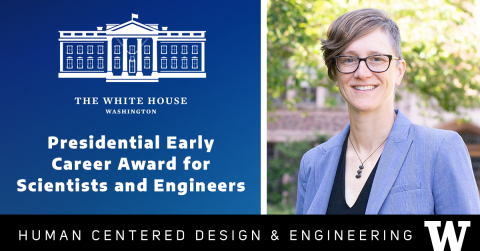
Thu, 01/16/2025
HCDE Professor Kate Starbird awarded Presidential Early Career Award
HCDE Professor Kate Starbird is among a distinguished group of scientists and engineers across the country honored with a 2025 Presidential Early Career Award for Scientists and Engineers (PECASE) from US President Biden. Professor Starbird is recognized for her research on the dynamics of misinformation and disinformation online.
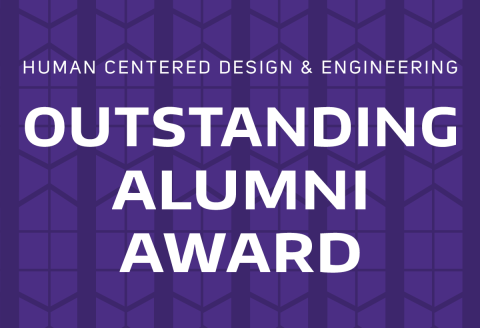
Wed, 01/15/2025
Announcing Outstanding Alumni Award in HCDE
HCDE is launching a new Outstanding Alumni Award to celebrate alumni whose achievements demonstrate the mission and values of the HCDE department. The award is designed to recognize HCDE graduates who have made significant contributions to their professional fields, demonstrated impactful leadership, and enriched their communities through innovative work or service. Now accepting applications until May 1, 2025.
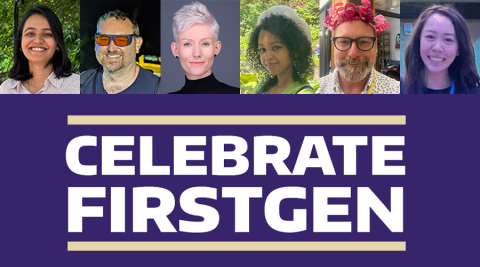
Fri, 11/08/2024
Celebrating HCDE's first-generation college students
On November 8, HCDE joins colleges and universities nationwide in celebrating National First-Generation College Celebration Day. Throughout the day we will be shining a spotlight on several members of our community who have forged their own paths to higher education. We are proud to share their stories as they continue to break barriers and shape the future.

Thu, 10/31/2024
Celebrating community, culture, and support: HCDE PhD candidate Leslie Coney draws on Black maternal health research to organize community baby shower
HCDE PhD candidate Leslie Coney is merging her research in Black maternal health with community support through Cradles & Culture, a community baby shower for Black birthing people and families in WA State. Supported by UW’s Black Opportunity Fund, the event celebrated parenthood, provided essential resources, and strengthened networks of support. By creating spaces like Cradles & Culture, Coney hopes to inspire similar initiatives that foster community support, building a future where no birthing person is at risk due to preventable disparities and where Black families are supported, informed, and empowered every step of the way.
Tue, 09/10/2024
Student Project Spotlight: The Bus Beacon
For a project in the Human Centered Design & Engineering course on User-Centered Design, a team of students explored the question: "How can information empower Metro King County bus commuters?" Their proposed solution, The Bus Beacon, aims to improve the bus commuting experience by centralizing information at the shared place all bus users must visit: the bus stop.
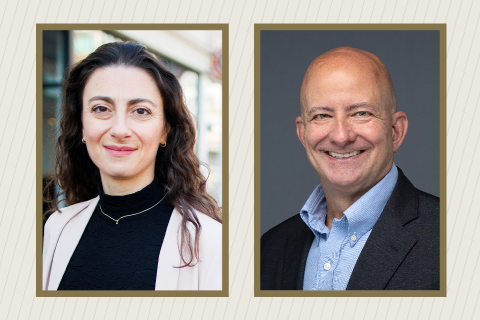
Fri, 08/09/2024
Christina Ciocca Eller and Robert Sharp named SECURE Center advisory board co-chairs
Harvard Professor Christina Ciocca Eller and Vice Admiral (ret) Bob Sharp have been appointed co-chairs of the newly established advisory board for the Safeguarding the Entire Community of the U.S. Research Ecosystem (SECURE) Center. Announced in July 2024 with a $50 million investment from the National Science Foundation, the SECURE Center, led by HCDE Professor Mark Haselkorn, aims to connect and empower the U.S. research community in addressing critical issues related to research security and integrity.

Wed, 07/24/2024
UW awarded $50M to lead U.S. research security center
Under a five-year, $50 million investment from the National Science Foundation, HCDE Professor Mark Haselkorn is leading a national consortium of research institutions to bolster national research security. The Safeguarding the Entire Community of the U.S. Research Ecosystem (SECURE) Center will empower the U.S. research community to address critical issues of research security and integrity.

Thu, 07/18/2024
UW researchers develop data visualization tool to advance child welfare
In response to the evolving needs of the child welfare system, UW researchers are advancing access to visualizations of foster care data. John Fowler (HCDE PhD '23) and Professor Mark Zachry developed VizCare, a new tool to increase the use of research in child welfare decision-making.
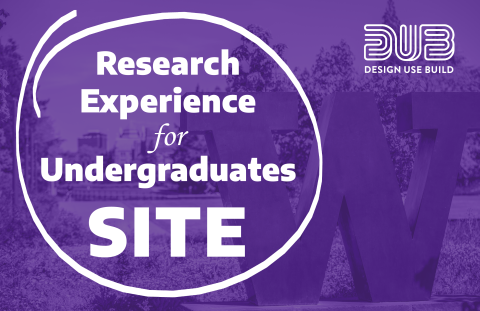
Tue, 06/25/2024
Expanding undergraduate opportunities: UW to establish NSF REU Site for human-centered computing research
Thanks to a new grant from the National Science Foundation, UW's Design Use Build (DUB) group, a grassroots alliance of researchers and practitioners interested in Human Computer Interaction & Design at the University of Washington, is expanding opportunities for undergraduate students to do human-centered computing research by establishing a new Research Experience for Undergraduates (REU) Site.
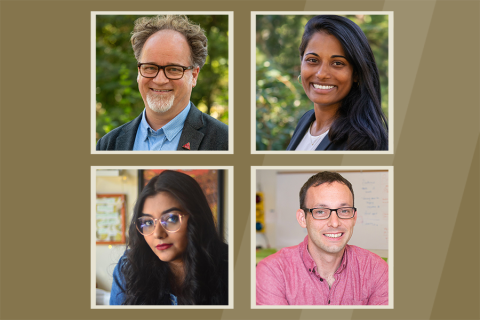
Fri, 06/21/2024
Students recognize HCDE faculty with FACET Awards
HCDE faculty Katya Cherukumilli, Brock Craft, Sucheta Ghoshal, and Sean Munson are recognized with awards from the Career Center @ Engineering's Faculty Appreciation for Career Education & Training (FACET) program. This student-nominated award recognizes engineering faculty who have helped students with professional development through mentorship and career preparation.

Mon, 06/17/2024
PhD Candidate Sourojit Ghosh receives Presidential Dissertation Fellowship
HCDE PhD candidate Sourojit Ghosh has received a prestigious UW Graduate School Presidential Dissertation Fellowship for the 2024-2025 academic year. In his dissertation work, Ghosh is studying the harms created by generative AI tools, particularly towards traditionally marginalized populations. Ghosh is researching text-to-image generators and examining how human-centered approaches can influence the design of generative AI tools.
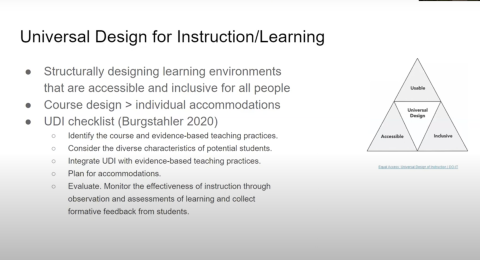
Thu, 06/13/2024
Recording: Inclusive Pedagogy Workshop with Sarah Coppola and Sourojit Ghosh
In April 2024, HCDE instructors Sarah Coppola and Sourojit Ghosh led a community workshop on adapting visually-based courses for blind and low-vision students. View a recording of the workshop here.
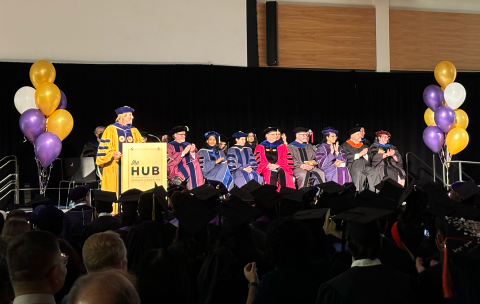
Tue, 06/11/2024
2024 Graduation & Awards Ceremony
The Department of Human Centered Design & Engineering held its 2024 Graduation & Awards Ceremony on the morning of Friday, June 7, in the Husky Union Building Ballroom. In 2024, HCDE awarded 79 students Bachelor of Science degrees, 125 with Master of Science degrees, and 11 with doctoral degrees.
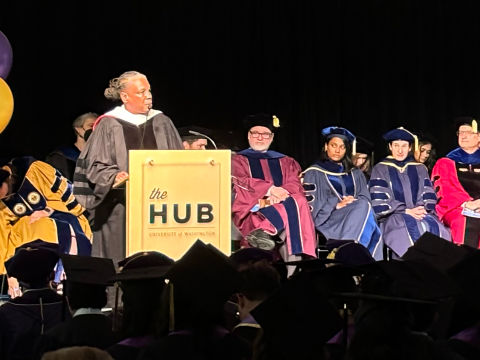
Tue, 06/11/2024
Graduation Address to the class of 2024 by Trish Millines Dziko
Trish Millines Dziko, Co-founder and Executive Director of the Technology Access Foundation, delivered the 2024 graduation address for the Department of Human Centered Design & Engineering. View the address here.